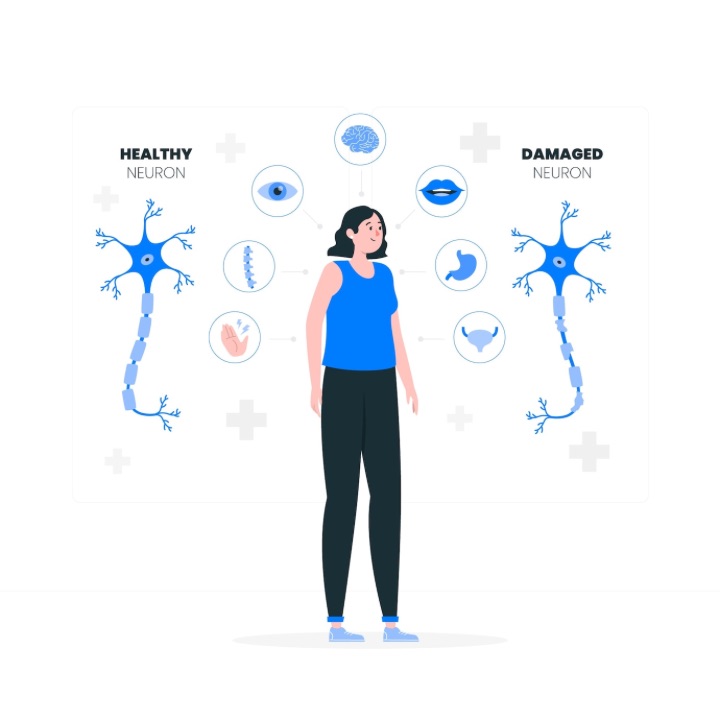Are you looking to improve your physical functioning and quality of life?
Neurological physiotherapy could be the answer. It’s a specialized form of physical therapy that is useful in treating neurological conditions to achieve their goals.
You’ll receive an individualized treatment plan, education about your condition, and strategies to manage pain.
Get ready to maximize the benefits of this form of physiotherapy!
You may be wondering what it is. It’s a form of physical therapy that focuses on helping individuals suffering from neurological related conditions or injuries.
A neurological trained physiotherapist uses rehabilitation, posture correction, and exercise techniques to help the patient with their condition.
Neurological rehabilitation aims to improve mobility, balance, coordination, and strength. Neuroplasticity is also used in neurological physiotherapy, which encourages the brain to develop new pathways for movement while strengthening existing ones.
Neurological physiotherapy can help improve the quality of life through physical movement for those with various neurological related conditions and for people of all ages.
The benefits of this form of therapy include improved movement, coordination, and balance.

Photo Credit: Freepik
This area of neurological physiotherapy is a type of rehabilitation that focuses on treating disorders and impairments that affect the nervous system. It is tailored to an individual’s treatment situation and can help with conditions like stroke, multiple sclerosis, Parkinson’s, or injury of the spinal cord.
This form of physiotherapy uses the brain’s neuroplasticity to relearn lost skills or develop new ones. It also works to improve strength, posture control, and gait patterning as well as helping manage pain.
This specialized form of physical therapy helps individuals regain independence in their daily activities by improving an individual’s physical function.
You may not know it, but many common neurological related conditions can be treated with physiotherapy.
Various neurological related conditions, such as stroke, sclerosis, Parkinson’s, and injury of the spine can all benefit from physiotherapy.
Stroke is a cerebrovascular event caused by a disruption of the blood flow to the brain.

Photo Credit: wavebreakmedia_micro
Multiple sclerosis is an autoimmune disorder that affects the central nervous system and causes damage to nerve fibers in the brain and spine.
Parkinson’s disease is a neurodegenerative movement disorder that affects limb function and movement due to decreased dopamine levels in the brain.
Finally, injury of the spinal cord can often lead to permanent loss of motor function or sensation below the injury site depending on severity.
Physiotherapy plays an important role in helping patients manage their symptoms and improve quality of life for those living with these conditions.
Through physical therapy exercises, people can reduce pain and increase mobility which helps them live more independent lives despite their neurological condition.
Physiotherapists use various techniques to help individuals manage their neurological related conditions and improve overall quality of life.
A neurological therapist may do a comprehensive assessment of the issues and employ a range of interventions such as strength training, balance exercises, coordination activities, and gait retraining to treat patients with neuro-related conditions like traumatic brain injury, spinal cord injury, spasm or cerebral palsy.
Proper stretching can help reduce the risk of further damage or muscular pain in patients with neurological issues. Techniques such as electrotherapy provide stimulation and relief for those who suffer from nerve-based pain.

Photo Credit: jcomp
Balance training helps people with motor impairments develop stability and coordination skills through specific exercises tailored to their needs.
Lastly, massage therapy is also used to relax tense muscles and promote general relaxation to ease acute or chronic health conditions associated with neurological disorders and increase muscle strength.
When choosing a health professional who work with people to help manage their neurological condition, it’s important to consider factors such as experience, qualifications, and specialized techniques aimed at improving an individual’s physical well-being.
To get the most out of your first neurological therapy session, it’s important to be prepared.

Photo Credit: drobotdean
Beforehand, research brain and spinal cord injuries that you may have, as well as any peripheral nerve issues you may be dealing with.
Finding a physiotherapist who specialises in people with neurological related conditions is also important. Ask questions about their experience and what treatments they offer.
Make sure to write down any questions or concerns you may have before the appointment so that you can discuss them during your session.
Lastly, wear comfortable clothing and bring all relevant medical records with you for your first visit.
With the right preparation and the help of an experienced therapist, you will be well on your way to reaching your goals!
Now that you understand the basics and are ready to attend your first session, knowing how to maximize its potential benefits is important. Here are a few tips for getting the most out of your neuro physiologist:
Exercise regularly outside of physiotherapy sessions. Focus on strengthening the limb receiving rehabilitation and improving range of motion as directed by your physiotherapist. Incorporate regular aerobic exercise into your routine as well, as this will help strengthen the central nervous system overall and help in rehab.
Follow advice from medical professionals closely. Ask questions if there is anything you don’t understand or if something doesn’t feel right during a movement or exercise prescribed by your physical therapist. Trust that they have been trained to utilise age-appropriate treatments for neurological disorders, so follow their instructions carefully!
Although you can benefit from neurological physio, it’s important to be aware of the potential risks and complications that may arise.

Photo Credit: storyset
Neurological related conditions like Parkinson’s disease can affect physical function, but treatment with neurological physio can help improve the situation.
However, it is important to note that because physiotherapy involves manipulating nerves of the brain, there is a risk of creating additional damage if not done correctly.
Additionally, certain exercises or treatments may not be suitable for an individual depending on their medical history or current condition.
It is essential to consult with your doctor before undergoing any neurologic physiotherapy.
Neurological physiotherapists must have specialized qualifications and training to care for those with neurological related conditions. They typically possess a degree in physical therapy and/or certification in neurological rehabilitation. Experience is also key, as it allows them to understand the unique needs of their patients better.
Typically, a physiotherapy session lasts between 30 minutes to one hour. It depends on the patient’s condition and the type of treatment they require.
Yes! There are lifestyle changes you can make to improve your neurological related condition. Eating a balanced diet, exercising regularly, and reducing stress can all help. Getting enough sleep and staying hydrated will also benefit your health.
Yes, there are additional therapies you can do to improve your neurological related condition. These may include exercises like yoga, pilates or tai chi, as well as relaxation techniques and massage. Talk to your therapist to find out what other therapies might suit you.
Long-term effects of physiotherapy can include improved movement, increased strength and flexibility, reduced pain, better balance and coordination, and improved quality of life.